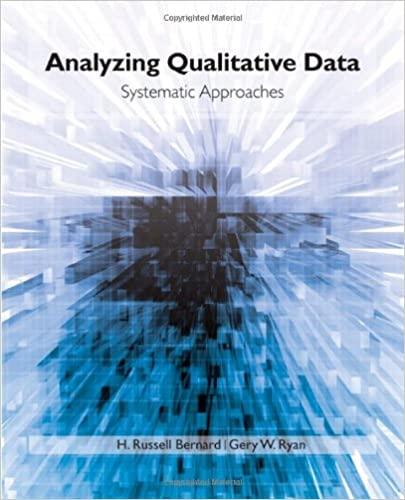Question
Second, based on the ethical theory you defended in Discussion: Compare and Contrast Metaethical Theories , formulate an ethical application on this specific issue in
Second, based on the ethical theory you defended in Discussion: Compare and Contrast Metaethical Theories, formulate an ethical application on this specific issue in a thread. You are expected to use both textbooks as well as outside academic sources to support your analysis and argument. As you write your thread, consider the following flow for your essay:
- Step 1: Briefly summarize what theory you defended in Discussion: Compare and Contrast Metaethical Theories and what applied issue you are addressing in this discussion. If you have changed your mind on which theory from Discussion: Compare and Contrast Metaethical Theories you think is stronger, you may write an application for the theory you NOW think is the stronger theory. For example, if you defended Egoism and now think a Christian ethical theory is stronger, you may apply a Christian ethical theory.
- Step 2: Articulate a detailed application based on your theory. This should be the bulk of your thread.
- Step 3: Briefly describe a strong counterargument to your application and respond to it. For now, keep it brief (no more than one paragraph). In the Capstone Essay Assignment, you will have more room to elaborate.
Respond to one classmate's thread who wrote their thread on a different topic than your own. Provide respectful and constructive criticism regarding their application and areas of disagreement. You are expected to incorporate the textbooks and outside academic sources in your reply.
Be sure to carefully define your terms. You are expected to support your position with rational arguments, fitting examples, and expert sources. needs to be 500-600 words.
I defended Christian ethical theories in the compare and contrast metaethical theories discussion forum. Christian ethical theories are what I believe most of my ethical standards are driven from. Christian ethical theories base more of their ethics on what is said in the Bible. They know and recognize truth and use both reason and revelation in their judgements. Christian ethical theory defines "the good" as bringing the glory of God into our lives daily and to attempt to emulate Christ in what we do. Christian ethical theorists know "the good" because it is what is taught and spoken in the Bible. We have the ten commandments to follow and live our lives by. Deontological systems of ethics are principle-based systems, in which actions are intrinsically right or wrong, dependent on adherence to the relevant moral principles or values. What distinguishes various types of deontological systems is the source of the principles that determine morality. Both the notion of divine commands and natural law will be discussed, and we will see that they are both important components of a Christian ethic.[1]
For an issue in applied ethics that draws interest to me, it would have to be a just war. War will always unfortunately take place. There may be times of relative peace time, but there will inevitably war in the future. Matthew 24:6 states, "And you will hear of wars and rumors of wars. See that you are not alarmed, for this must take place, but the end is not yet" (ESV). In looking at a just war in a Christian ethical theory, it has to make sense to go to war as there is no other option. War can be necessary and proportionate only if it serves an end worth all this death and destruction. Hence the importance of having a just cause. And hence too the widespread belief that just causes are few and far between. Indeed, traditional just war theory recognizes only two kinds of justification for war: national defense (of one's own state or of an ally) and humanitarian intervention.[2]
In looking at national dense of one's nation, a just war may be considered in Christian ethical theories if we would lose freedoms or liberties that are given to us such as the freedom of religion or certain rights to life. In another country invaded us where we would lose these freedoms, a just war may be considered. In looking at a just war due to humanitarian intervention, Christian ethical theorists have an easier time justifying war. In looking back to the Nazi regime during World War II, it is easy to justify war when looking at the concentration camps and other horrors of the Nazi regime. It took the strength of the Allied forces to come together to stand up against the Axis powers and the horrors they exposed the world to.
A counterargument to a just war is simply put that all war is unjust and has no place in ethical theory. Romans 12:18 states, "If possible, so far as it depends on you, live peacefully with all" (ESV). We may all try to live in peace, but conflicts will start up around the world when different ethical theories are used. War so disrupts the normal rules of society that morality goes out the window.[3] This may also be true in the fog and uncertainty of war.
Step by Step Solution
There are 3 Steps involved in it
Step: 1

Get Instant Access to Expert-Tailored Solutions
See step-by-step solutions with expert insights and AI powered tools for academic success
Step: 2

Step: 3

Ace Your Homework with AI
Get the answers you need in no time with our AI-driven, step-by-step assistance
Get Started


